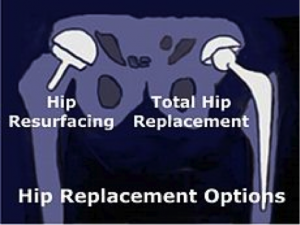Hip resurfacing
This page contains information about total hip resurfacing. If any questions remain unanswered please ask your doctor or specialist.
About arthritis
Several states of joint damage which cause pain and stiffness are defined as arthritis.
Osteoarthritis is one of the most common forms which causes on-going deterioration to the joints. Some forms of this condition also cause soreness and swelling.
In time arthritis can cause cartilage and joint damage.
Alternative treatments
Pain killers, i.e. paracetamol, and anti-inflammatory pills, i.e. ibuprofen, can help reduce these two conditions. Dietary supplements taken on the advice of your doctor may also offer some relief.
Walking aids, from walking sticks to shoe-risers, can help with mobility which is important because keeping moving reduces stiffness.
Steroid injections into the hip joint may also be offered to help reduce symptoms.
Unfortunately, as the arthritis gets worse, none of these treatments remain as effective.
How surgery helps
Successful total hip replacement surgery can provide reduced pain and more mobility.
Hip resurfacing – can be an alternative to a hip replacement as it is a less invasive operation and recovery time is quicker. It involves removing the upper surfaces of two areas of bone – the femur (thigh bone) and the cavity in the pelvis where the femur sits. A metal surface replaces the bone, so instead of bone on bone the end result is metal on metal. The procedure requires relatively strong bones, so it is not suitable for people over 65 or women who have gone through the menopause.

Problems that might occur
General
• Scarring
• Pain
• Bleeding
• Infection of the wound
• Difficulty urinating
• Infection of the chest
• Blood clots
• Heart attack
• Stroke
Specific side effects
• Infection of the hip
• Loosening
• Damage to the nerve
• Difference of leg lengths
• Damage to blood vessels
Time to recover
Hospital recovery is expected to take three to seven days. Once discharged, you will still need to use crutches or similar for a short while.
Regular exercise will ensure the best recovery but do consult your doctor about the type of exercise.
In summary
Whilst there are some obvious causes for hip joint arthritis (injury or rheumatoid arthritis), sometimes no obvious reason is present. Hip resurfacing can relieve sufferers of pain and mobility problems. However the procedure requires relatively strong bones, so it is not suitable for people over 65 or women who have gone through the menopause.
We look forward to hearing from you to discuss your needs and see how we can get you the best treatment, quickly and affordably.
Please contact us for further information about treatments not listed here

